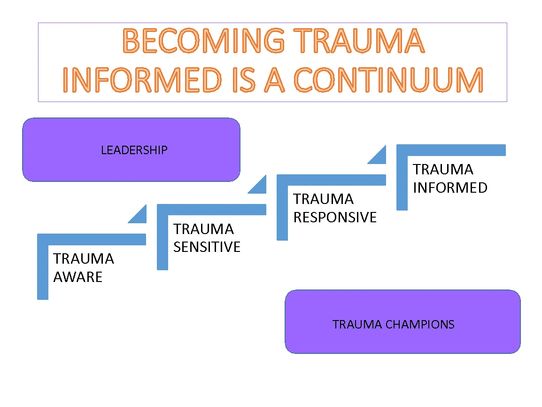TRAUMA INFORMED CARE TRAINING & CONSULTATION
WHO I SERVE
Church and Ministries
Criminal Justice System
Educational Systems
Behavioral Health and Human Services
Community Organizations

WHAT IS TRAUMA INFORMED CARE
A trauma-informed approach is an ongoing organizational change process. A “trauma-informed approach” is not a program model that can be implemented and then simply monitored by a fidelity checklist. Rather, it is a profound paradigm shift in knowledge, perspective, attitudes and skills that continues to deepen and unfold over time.
WHAT ARE THE PRINCIPLES OF TRAUMA INFORMED CARE
Principles: The Missouri Model is guided by five key principles: safety, trustworthiness, choice, collaboration, and empowerment. According to the Missouri Model, the principles are defined as the following:
- Safety: Ensure physical and emotional safety, recognizing and responding to how racial, ethnic, religious, gender or sexual identity may impact safety across the lifespan.
- Trustworthiness: Foster genuine relationships and practices that build trust, making tasks clear, maintaining appropriate boundaries and creating norms for interaction that promote reconciliation and healing. Understand and respond to ways in which explicit and implicit power can affect the development of trusting relationships. This includes acknowledging and mitigating internal biases and recognizing the historic power of majority populations.
- Choice: Maximize choice, addressing how privilege, power, and historic relationships impact both perceptions about and ability to act upon choice.
- Collaboration: Honor transparency and self-determination, and seek to minimize the impact of the inherent power differential while maximizing collaboration and sharing responsibility for making meaningful decisions.
- Empowerment: Encouraging self-efficacy, identifying strengths and building skills which leads to individual pathways for healing while recognizing and responding to the impact of historical trauma and oppression.
This information was developed by a group of Missouri organizations, MO State Trauma Roundtable, that have been active champions in addressing the impact of trauma and working towards becoming trauma informed organizations. They represent a variety of organizations that serve children, youth, families and/or adults in a variety of settings including healthcare, inpatient psychiatric, substance use disorder, and community based mental health services. Missouri Model: A Developmental Framework for Trauma Informed, MO Dept. of Mental Health and Partners (2014)
Trauma Informed Care see: https://dmh.mo.gov/trauma or
The trauma informed care movement is gaining attention and there are many groups across the nation now dedicated to teaching this model of organizational cultural change. It is very important to be an informed consumer and to look to those who have a proven track record for understanding the model and integrating it within systems of care.
Most organizations or systems progress as noted in the picture below:

SO….WHAT QUALIFIES ME TO PROVIDE TRAINING AND CONSULATION
I do have a proven track record and have done the work within a very challenging organizational culture!
- I recently retired as Trauma Informed Care Coordinator at the first high security Forensic Mental Health Center in the nation to become trauma informed from 2012-2021.
- I have developed and facilitated hundreds of Trauma Informed Care Trainings for a variety of organizations and at various conferences across Missouri including:
- In-patient forensic mental health centers
- Schools
- CASA
- Corrections
- Hospitals
- Department of Health and Human Services
- Central Mo Public Administrators
- Other Community organizations
- DD Services
- College classes
I worked with the Trauma Informed Care Lead Manager at the Missouri Department of Mental Health to develop state-wide trauma informed care training and facilitated the first Learning Collaborative for Forensic Mental Health Facilities across the state.
I have participated in the Missouri Trauma Round Table since inception and have been a part of developing several trauma informed care guidance documents that remain actively in use by many organizations.
I have a career spanning 30 years- working in child welfare for 12 years in both rural and urban settings in Missouri; working in Kansas City, MO with organizations providing services to individuals and families living in homelessness; and the last 14 years with Fulton State Hospital/Department of Mental Health serving in a variety of roles as an LCSW.
I have provided clinical training in several modalities for clinicians across systems including an array of trauma specific treatment modalities:
- Motivational Interviewing
- Strengths Based Case Management
- Prolonged Exposure Therapy
- Integrative Treatment of Complex Trauma
- Trauma Focused Cognitive Behavior Therapy
- MTREM (Men and Women’s Trauma Recovery and Empowerment Model) for Group Treatment
Additionally, I have training in several other modalities including: Dialectical Behavior Therapy, Cognitive Behavior Therapy, Cognitive Processing Therapy, EMDR (Eye Movement and Desensitization Reprocessing) , Grief and Loss, and Acceptance and Commitment Therapy.
If interested in learning more about Trauma Informed Care Training or Consulting contact me now for a free 20 minute phone consultation. Training and Consultation can be tailored to organizational or community needs.
573-615-4320 https://sendsafe.to/wrencounseling@gmail.com
Copyright © 2021 Wren Counseling Solutions LLC- All Rights Reserved.